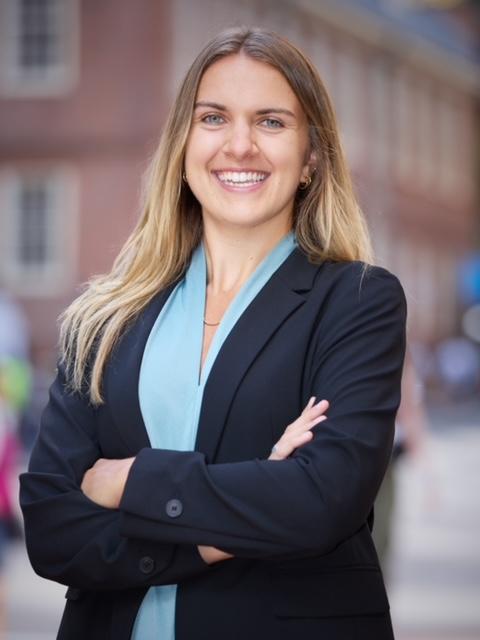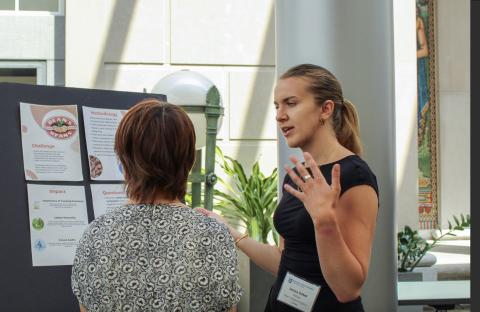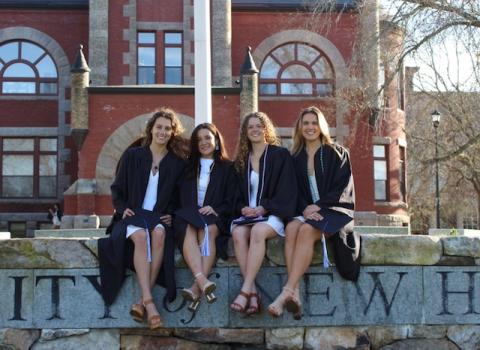UNH Sustainability Experiences Lead to Post-grad Success

In the first of our new series, Wildcat Alumni Interviews, we caught up with Jessica Seibel, Climate Action Consultant, Climeaction (Psychology and Sustainability dual major), who graduated in spring of 2024, to find out what she's up to, where her career is headed, how UNH experiences helped her in her job search, and what advice she would give to current students.
Why and how did you get involved in sustainability, and when did you know that you wanted to make this part of your career path?
I transferred to UNH my sophomore year and at my previous college I took an environmental science as a social science course, and this course is what sparked my initial interest in sustainability. I had always been interested in environmental science, but this course taught me more about the people pillar of sustainability. Seeing the environmental impacts and social impacts made me want to continue learning about sustainability.
When I saw UNH had a strong Sustainability Institute and looked through all the offerings, I saw that I could pair this newfound interest of sustainability with my psychology major at UNH. My first sustainability course at UNH was SUST 401, and this class strengthened my understanding of all the different paths you can take with sustainability. I shifted my focus more to the business and the corporate side of sustainability, and as I learned about ‘business as a force for good’, my interest just continued to grow from there.
What were some of your most memorable experiences at UNH related to sustainability?
I remember my mom put the B Impact Clinic on my radar, saying: “you should apply for the B Impact Clinic; it seems like something you'd be interested in”. After my mom mentioned it, someone from the Clinic came into my SUST 401 class to talk about her experience. Her passion and enthusiasm around the Clinic really drove me to apply. I was nervous about applying, especially since I didn't have a business background, which was intimidating for me.
After being a member of the Clinic, I understood that I didn’t need a business background; that was the beauty of the Clinic, it was for all majors. That class really highlighted a holistic approach to sustainability – it is a common misconception that when people think of sustainability, they just think of the environment, but this class highlighted the layers of the triple bottom line, people, planet, and profit.

I enjoyed working with our client in the Clinic, Blackstone Point Oysters, and the face-to-face interaction with someone running a business, trying to make a profit, and also trying to protect the planet, and the community they operate in. It was a very heartwarming experience working with people with a passion for making a positive impact. There was a lot of peer education as well – everyone really wanted to learn, teach and support each other. That was a great experience which then allowed me to have the experience to apply and be accepted for my internship at VF Corporation. I continued strengthening my knowledge about B Corporation Certification, and my passion for B Corp-related work grew.
My second impactful experience was combining the Climate Action Clinic with my Sustainability Capstone. I enjoyed that I was able to pair the two. Again, applying to the Clinic I had these daunting thoughts of ‘oh, carbon accounting; I’m not a big numbers person,’ but both instructors were supportive in helping me learn the basics of carbon accounting. Our peer mentor was also awesome, not only in the Clinic, but also within our Capstone. Through this project our team learned about SIMAP (UNH’s carbon and nitrogen accounting platform) and all the great tools you can use within the program. I enjoyed the opportunity to be able to be client facing again, and work in a group a that turned into a friendship.
If I had one recommendation, I would tell people to pair their Capstone with one of the Sustainability Institute’s Clinics. Working on this project in two courses enriched my understanding of carbon accounting and the seafood industry.
Can you say a little bit more about how the Capstone and Clinic were linked and what was the nature of that that work?
Our group was working with the client, Culimer USA. Within the Clinic, it was a lot of data collection and inputting it into SIMAP to calculate their carbon footprint itself. In the Capstone, I was working more with the company to research sustainability within the seafood industry, researching more on the qualitative side of the project. It was a cool pairing to be doing the footprint, and then really working to understand, what are the sustainability trends within the seafood industry? What are other seafood companies doing?
We also were able to learn about other people's Capstone projects, too. That's the great thing about the Capstone, the diversity in everyone's projects. It’s a completely project-based course and everyone's doing something they're passionate about. I keep saying it, but passion is a huge thing. I feel like within the Sustainability Institute, everyone's driven by the passion for sustainability and doing better. That's what makes it such a fun environment to be in because you're all passionate about the same thing.
When you think about the skills that you learned through these experiences, what skills come to mind that really helped you?
Being client-facing would be the #1 thing I learned through these experiences, being able to work with a client, hear a real-world problem, and then help them fix it or find a solution is great experience to gain within undergrad.

In addition to developing my client-facing skills, I gained an understanding of how to calculate a carbon footprint, the different types of scopes for carbon emissions.
The teamwork within the Clinics and my Capstone helped strengthen my ability to work well in team settings. I was working with other students and learning when to lead, but then also learning when to follow and figuring out those dynamics. Lastly, I strengthened my presentation skills – I was always someone who hated presenting. I remember, it's funny looking back now, but before my first B Impact presentation, I was so nervous, practicing with flash cards, and stressed out. And then I remember going into my Capstone presentation or my Climate Action Clinic and thinking, ‘oh, it's just a presentation, I know how to present’. And I'm already seeing that transfer into my career now. I had to give a presentation yesterday and the nerves weren’t there, as they probably would have been if I hadn’t gotten that experience in undergrad.
Did any of these experiences position you well to get your job?
Definitely. I am currently working for Climeaction as a Climate Action Consultant. Climeaction was founded in Ireland and just opened their first US office in Boston! Climeaction is a B Corp certified organization that simplifies decarbonization efforts for businesses, helping them improve ESG performance, and improve energy efficiency.
I have enjoyed my first month at Climeaction; it still has startup energy, even though they have an established company back home! My knowledge of carbon footprinting that I developed through the Climate Action Clinic and my Fellowship, definitely helped me land this job. My experience in B Corp Certification, helped me understand that Climeaction was committed to sustainability as a B Corp themselves. I understood the process and rigor that goes into being certified and that drew me to Climeaction.
Sustainability work can be daunting, as you know, and there's a lot of climate anxiety, for all of us. What excites you, what gives you hope about working in the sustainability career field?
I kind of touched on it a little bit earlier, but I would say the people.
It can be easy to get lost in negativity or climate anxiety. It’s real. But I think the people that are passionate about sustainability and want to make change, help people/communities/the environment, that’s really what drives me and keeps me motivated. And later down the line, if I can be that person that's motivating someone else and helping them stay interested in it because of my passion, I'd love to be that person.
At UNH that environment was completely there, it was fostered and that's what drove me to pursue this passion.
What advice do you have for current students as they think about their time at UNH and beyond?
Get involved. That would be the biggest piece of advice. The B Impact Clinic and the Climate Action Clinic are the reasons why I got internships and what stood out on my resume.
I understand that feeling of ‘I don't want to take another two-credit course, I already have a ton on my plate’. But it's not a lot and it is so helpful if you're passionate about it. You'll find enjoyment and support, and although it's super important, it's a low stakes sort of experience where you get to learn. People know that you're a student and they’re willing to help you. They understand when you make a mistake and support you in learning how to fix it. Getting involved helps you develop the skills that are very transferable post grad!
